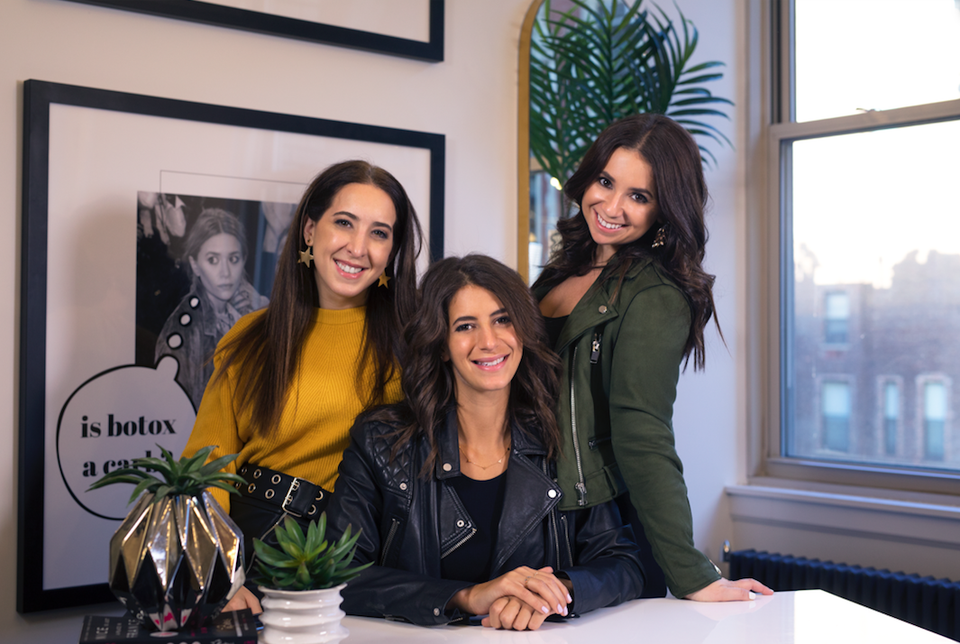The founders of Betches Media started their company in 2011 when they were seniors at Cornell University. CEO Jordana Abraham, COO Samantha Fishbein and CCO Aleen Kuperman’s WordPress blog catered to their peers — college-aged women and recent graduates. “We felt like we had a unique perspective on the environment we were in and the types of people we were surrounded by – particularly the glorified ‘bro’ culture of ‘fratire’ that was big at the time,” they remember. “There was no complementary voice to embody the female version of this type of person, but we felt like we understood her.” They each invested $1500 and started writing. The founders still own 100% of Betches and say that the company has been profitable for more than four years.
Today the team works from their Manhattan headquarters. The rooms are decorated with patterned wallpaper, a gallery wall with framed photos of their favorite memes and wall art with sayings like the Mean Girls-inspired “So you agree? You think you’re really pretty?” and “You’re doing amazing sweetie.”
The Betches site covers a wider range of topics from news to beauty advice all written in their signature sarcastic and snarky tone. “Keep up with WTF is going on in the world here, starting with our daily newsletter sent straight to your inbox. Uninformed is no longer cute, and sometimes you just need for your funny informed friend to explain what’s going on to you (that’s us, duh),” reads the description of their news and politics vertical and newsletter The SUP. They produce podcasts and video series and have an e-commerce shop. A notebook cover reads, “This should’ve been an e-mail.” A shirt declares, “I want to be where the people aren’t.”
The founders have written two New York Times bestselling “satirical self-help books”: Nice Is Just A Place In France: How To Win At Basically Everything and I Had a Nice Time and Other Lies: How to Find Love and Sh*t Like That. Their newest book, When is Happy Hour? Work Hard So You Can Hardly Work, is “a guide on how to thrive professionally, get ahead at your job, and basically become the Beyoncé of whatever you aspire to do.” The Comedy Central animated television series Betches is in the works with the founders and Emma Roberts serving as executive producers, according to the Hollywood Reporter.
Betches’ revenue is predominately earned from brand partnerships that include 360-degree strategic campaign conceptualization, video production and execution, branded social and digital assets and artwork, experiential event marketing and influencer activation, according to their advertising page, which also states that Betches had 2 billion impressions, more than 6 million users and 155 million video views per month in 2017. Betches has a large social media following and 6.4 million followers on Instagram alone. Although they declined to share their exact revenue, Forbes estimated that Betches’ revenue exceeded $5 million in 2017. I spoke to the founders, who were all named to the 2019 Forbes 30 Under 30 Media list, about running a profitable media company, growing a large social media following and their best career advice.

What has been the biggest challenge and, on the flip side, the biggest reward of starting Betches?
The biggest challenge is probably that none of us had any real business education when we started, so we had to teach ourselves and learn from our mistakes and experiences. The biggest reward is that we get to work with each other to grow an incredible company that (we’re told) entertains and inspires people on a daily basis.
What are your responsibilities as cofounders of Betches?
We collectively head the business from both a creative and strategic standpoint. We are still very hands-on with the content, particularly on Instagram and host the majority of Betches Media’s podcasts. We also manage the day-to-day operations of the business while also finding new projects and ways to generate revenue and grow our audience.
What advice do you have for other entrepreneurs who hope to scale a social media platform and publication?
Have a really strong idea of what your voice is and try to offer something that isn’t already out there. Then work really hard to grow and don’t get discouraged when you’re not immediately seeing results. There’s no such thing as a true overnight sensation.
What advice do you have for other entrepreneurs who want to make a publication profitable?
Leverage your unique voice to align with brands on content that they will pay you for, but that will also actually offer something to your audience so you can show really strong proof of concept and generate more partnerships. Keep your team lean and don’t over-hire and don’t spend on products or platforms that are not completely necessary so you can keep your costs down.
Unlike many media company founders, you didn’t raise any outside funding. Why was that an important decision for you and what advice do you have for other founders considering bootstrapping?
Raising outside funding is something we’ve gone back and forth on for a long time and, so far, we haven’t done so because we haven’t found a situation that made sense for us from both a creative and a financial standpoint. Owning the company means we have full control of the direction that we can take it in creatively, which is extremely important to us since our creative direction is what’s gotten us to where we are. Our advice for other founders considering bootstrapping is that it’s important to know that this will likely require some sacrifices because you’ll be putting your profits back into the company which will mean less disposable income for you. So being willing to accept those sacrifices and the struggles that can come with it is extremely important.
You’ve written multiple books including your newest, When’s Happy Hour. How did you decide to tackle career advice?
Our audience has been writing to ask our advice since 2011, and as many more of them graduated college and started careers, we started getting a lot more career questions. We also felt like we finally had the career experience to be able to write a book on the topic as we’ve been growing Betches for the past seven years.
What are the top three takeaways you want people to get from reading the book?
The first takeaway is to keep an open mind about what you want to do with your life and what you’re good at. Many people graduate college or even high school thinking they have their career path set, only to get their first job and realize it’s all wrong for them. The same can happen when you’re older, but if you’re always observing with an open mind how you feel about what you’re doing and what you feel aligned with, you can make better choices in your future career moves. The second takeaway is that you should always ask for what you want; the worse someone can say is “no.” Third is to never send a calendar invite without context.
What’s the biggest lesson you learned at work and how did you learn it?
Accept your weaknesses and admit to yourself that you need to let others take control of the things you’re not great at. For several years it was challenging for us to hire people because we didn’t want to give up control or entrust what we were doing with other people. But we were stretched very thin and to be able to make more money, we had to make the move and hire people, and once we did the company was able to grow much more quickly and substantially.
What is the best advice you’ve ever received?
Stop saying ‘like’ and enunciate your words.
What is your business advice for other young professional women?
Be proactive and put in the effort. Sometimes work is going to feel awful and you’re really not going to want to do what you have to do. When all you want is to get through the next dreadful project, instead of rushing through it and doing a mediocre job, try to reframe the challenge not as a work task but as a task that is actually helping you work on yourself. Work on not being the kind of person who does a mediocre job just because they ‘don’t feel like it.’
































